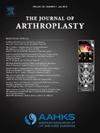初次全髋关节和膝关节置换术后三十天和一年内因植入相关并发症再次入院的情况:以奥地利 34,392 名患者为对象的人群研究。
IF 3.4
2区 医学
Q1 ORTHOPEDICS
引用次数: 0
摘要
简介:这项研究的主要目的是评估奥地利全髋关节(THA)或全膝关节(TKA)成形术后因植入物相关并发症导致的30天和1年非计划再入院率。次要终点是再入院的原因以及因人口统计学和医院规模不同而导致的翻修风险差异:从政府维护的数据库中检索了一年内(2021年1月至2021年12月)奥地利骨科和创伤科接受THA(18508人)或TKA(15884人)的患者数据。计算了非计划再入院的绝对频率和相对频率。调查了因植入物相关并发症导致的THA或TKA术后30天和一年内再入院的风险因素:任何植入物相关并发症的 30 天和一年再入院率分别为 1.0%(34,392 例中的 339 例)和 3.0%(34,392 例中的 1,024 例)。与 30 天(1,952 人)和一年(12,109 人)任何并发症的总再入院率相比,种植相关并发症的再入院率分别为 17.4% 和 8.5%。THA 患者的三十天再入院率(1.2%)高于 TKA 患者(0.8%;P = 0.001),而一年后的情况正好相反(THA,2.7%;TKA,3.3%;P < 0.001)。机械并发症(1024 例中的 554 例)是一年后再次入院的最常见原因。住院时间的延长与THA和TKA患者一年内再入院风险的增加密切相关。在大型医院接受治疗与TKA患者较高的一年再入院风险有关:结论:在奥地利,THA或TKA术后因植入相关并发症导致的30天和一年再入院率低于其他国家,再入院的风险因素和原因相似。考虑到近20%的全关节置换术后非计划再入院患者是由于植入相关并发症所致,因此有必要对这些患者的院内和出院后医疗护理进行优化。本文章由计算机程序翻译,如有差异,请以英文原文为准。
Readmissions at 30 Days and 1 Year for Implant-Associated Complications Following Primary Total Hip and Knee Arthroplasty: A Population-Based Study of 34,392 Patients Across Austria
Background
The primary aim of this study was to assess 30-day and 1-year rates for unplanned readmission due to implant-associated complications following total hip (THA) or total knee arthroplasty (TKA) in Austria. Secondary endpoints were reasons for readmission and differences in revision risk depending on demographics and hospital size.
Methods
Data on patients receiving THA (n = 18,508) or TKA (n = 15,884) in orthopaedic and trauma units across Austria within a 1-year period (January 2021 to December 2021) were retrieved from a government-maintained database. The absolute and relative frequencies of unplanned readmissions were calculated. Risk factors for 30-day and 1-year readmission following THA or TKA due to implant-associated complications were investigated.
Results
The 30-day and 1-year readmission rates for any implant-associated complication were 1.0% (339 of 34,392) and 3.0% (1,024 of 34,392), respectively. Relative to the overall readmission rate for any complication at 30 days (n = 1,952) and 1 year (n = 12,109), readmission rates for implant-associated complications were 17.4 and 8.5%, respectively. The 30-day readmission rates were higher in THA (1.2%) than TKA patients (0.8%; P = 0.001), while it was the opposite at 1 year (THA, 2.7%; TKA, 3.3%; P < 0.001). Mechanical complications (554 of 1,024) were the most common reason for 1-year readmission. Prolonged length of in-hospital stay independently associated with increased 1-year readmission risk in THA and TKA patients. Treatment at large-sized hospitals was associated with a higher 1-year readmission risk in TKA patients.
Conclusions
The 30-day and 1-year readmission rates for implant-associated complications following THA or TKA in Austria are lower than reported in other countries, with similar risk factors and reasons for readmission. Considering that almost 20% of unplanned hospital readmissions following total joint arthroplasty are attributable to implant-associated complications, optimization of in-hospital and postdischarge medical care for these patients is warranted.
求助全文
通过发布文献求助,成功后即可免费获取论文全文。
去求助
来源期刊

Journal of Arthroplasty
医学-整形外科
CiteScore
7.00
自引率
20.00%
发文量
734
审稿时长
48 days
期刊介绍:
The Journal of Arthroplasty brings together the clinical and scientific foundations for joint replacement. This peer-reviewed journal publishes original research and manuscripts of the highest quality from all areas relating to joint replacement or the treatment of its complications, including those dealing with clinical series and experience, prosthetic design, biomechanics, biomaterials, metallurgy, biologic response to arthroplasty materials in vivo and in vitro.
 求助内容:
求助内容: 应助结果提醒方式:
应助结果提醒方式:


